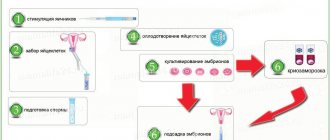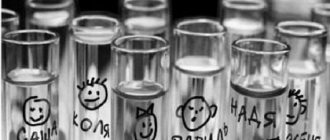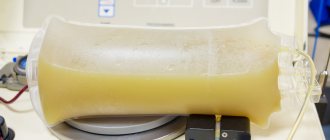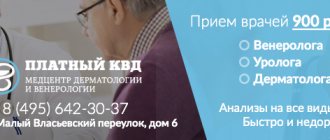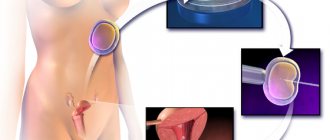Some women face the problem of lack of ovulation. The IVF method will help in this case too. A donor egg is selected for fertilization. After she is fertilized with her father's sperm, she is safely implanted in the uterus of the expectant mother. You can learn about the main stages of IVF with a donor egg and find answers to the most pressing questions about this procedure in this article.
Indications
IVF with a donor egg is identical to the procedure with biomaterial from future parents. The only difference is that the egg for fertilization is taken from a donor.
Use biomaterial from another woman when:
- a woman does not ovulate due to hormonal imbalance;
- during IVF, the ovaries are stimulated, but in some women they are insensitive to the effects of drugs;
- there are no ovaries after surgery;
- serious genetic diseases;
- developmental pathologies that have become an obstacle to the reproduction of eggs;
- previous attempts to inseminate one’s own egg were unsuccessful (usually 5 such attempts are made);
- the reason for the lack of one’s own biomaterial may be early menopause (a woman 35–40 years old whose menstrual cycles have stopped);
- The use of a donor egg is recommended for women over 40 years of age.
IVF with a donor egg gives good results, even if the woman is already over 40. The main thing is good physical fitness and health, which will be needed to bear a baby.
The essence of donor selection and embryo transfer
During the donation of donor material, a questionnaire is filled out, which includes all the information necessary to select the best possible embryo for future parents.
Types of IVF with a donor egg:
- Donor Bank. In this case, oocytes that are in a frozen state are used.
- Fertilization of newly obtained eggs. Fresh biological material is used immediately after a puncture is taken from a female donor.
Important! Newly obtained eggs that have not been frozen have a greater chance of successful fertilization, which means producing healthy embryos and their further development.
Methods for selecting donors:
- Using relatives or friends. In this case, married couples themselves bring a woman or a man to receive donor cells from them.
- Using an anonymous source. In such a situation, the couple is required to provide the blood type, Rh factor and a description of the donor’s appearance. In this case, the clinic offers options from its own database of donor embryos.
It should be noted that egg donors can be women no older than 35 years. Their biological material can be frozen for up to 9–10 years, after which it is either used during in vitro fertilization or destroyed.
Before a woman is transplanted with foreign embryos, she is thoroughly examined and the normal course of the menstrual cycle is checked. If there is a violation or there are no periods for a long time, the woman is prescribed special hormone therapy. This treatment is recommended several weeks before IVF. Only after successful stimulation of the ovaries and the menstrual cycle can a woman be transplanted with the finished material.
Interesting video:
Before the actual IVF procedure with donor embryos, the patient is checked for readiness of the inner layer of the uterus (endometrium) for pregnancy. If there are no possible pathologies, several embryos are implanted into the reproductive organ. However, there should be no more than 3 of them, since there is a possibility of multiple pregnancies, which not all couples agree to. To avoid such situations, doctors introduce 2-3 embryos into the uterine cavity, of which only one takes root and develops.
The in vitro fertilization procedure itself is painless. Using a special instrument (catheter), biological material is introduced through the cervix into its cavity. After the procedure, the patient is under observation for about another week.
Important! The chance of successful attachment and development of each embryo is approximately 10%. Results will be visible when your period stops or there is a positive pregnancy test. According to statistics, successful IVF conception in this way occurs only in 25–30% of married couples; the rest, unfortunately, fail and try again.
How is a donor selected?
Egg donation can be carried out:
- Anonymous - the couple does not know the donor and his passport details.
- Not anonymously - the case is more suitable when the donor is a friend or relative.
- Volunteer for free or paid. By agreement of the parties, the donor of oocytes can receive a monetary reward each time they donate, or they can do it for free.
All biomaterials for artificial insemination are collected in special clinics. To obtain higher quality biomaterial, the donor undergoes several selection procedures. The first criterion is age not older than 35 years. If the woman is of suitable age, a thorough examination begins:
- Interview. At this stage, information about the woman’s own children is studied (the donor must have at least one child and it must be healthy). For a more thorough study, a specialist may require a card of the children from the children's clinic, which indicates all the diseases suffered by the child, as well as a certificate from a psychiatrist about the psychological state of the mother. Information about the bad habits of a woman and her profession is clarified.
- The next stage of selection is permitted only if the specialist has studied all the information on the first and has given a positive response. It consists of a gynecological and general examination, a study of the woman’s physical condition using an ultrasound machine, and a detailed blood test is also required.
- At the last stage, possible deviations at the genetic level are studied. And only after a general examination and study of all tests, a specialist makes a conclusion about possible donation.
After taking the biomaterial, it can be transferred immediately for fertilization or frozen. The procedures differ significantly. Therefore, it is worth considering the features of fertilization with a frozen egg and a fresh one.
How to behave as a woman after embryo transfer
In the first days after transferring the embryo into the mother’s body as part of the IVF program, a woman must:
- limit physical activity, exclude performing strength exercises in the gym;
- do not lift heavy objects;
- It is recommended to remain in bed for the first 24 hours after the transfer;
- do not take hot showers or baths;
- avoid hypothermia;
- refrain from driving a car;
- healthy sleep at least eight hours a day;
- avoid nervous stress;
- adhere to a balanced diet;
- maintain sexual peace.
By contacting the Volgograd IVF Center clinic, specialists in the field of reproductology and embryology will conduct a number of necessary tests and studies, answer all patients’ questions and help solve the problem of infertility for each married couple.
Fertilization with a frozen donor egg
IVF with a donor frozen egg is the most common method. Future parents do not need to stand in line for a donor, and then also wait until the woman undergoes a long examination. The IVF procedure is carried out immediately after the couple seeks help. The price is significantly lower than in the case of using fresh biomaterial.
After the woman has passed the preliminary selection, she is prescribed hormone therapy. This is necessary to stimulate the ovaries and produce more eggs. Mature eggs are collected and placed in special cryochambers, where they are frozen. The biomaterial is stored until requested. At the right moment, it is defrosted and inseminated. A five-day-old embryo is implanted into the uterus.
Advantages of in vitro fertilization using foreign embryos
Eco with donor embryos has been used quite successfully for several decades. For some couples who have irreversible pathologies in the reproductive system, this is the only chance for pregnancy and childbirth.
Positive aspects of using donor embryos:
- Minimum load on the female body. When transplanting donor material, there is no need to oversaturate the woman’s body with a large amount of hormones to stimulate and regulate the functional activity of the ovaries.
- A short period of time before conception. With conventional IVF, a long protocol is most often used, and this takes up to 50 days. In IVF with donor embryos, everything takes no more than 30 days (one menstrual cycle). Here the most appropriate moment is calculated and the embryo is transplanted, and then its development is observed
- Possibility to postpone the procedure. If health problems or other circumstances arise, IVF using a donor embryo can always be postponed until a more appropriate time.
- Complete information about the embryo. Future parents are given all the necessary information about the biological material (appearance of donors, predisposition to genetic diseases).
Note! When choosing donor embryos, you should carefully study the attached materials and trust your feelings. All embryos are completely healthy, but it is not always possible to predict what will happen after pregnancy.
IVF with fresh donor eggs
This method is more effective, but it is more suitable for couples who know the donor. More often, this role is played by relatives, acquaintances or friends. The artificial insemination protocol itself will be completely different.
Peculiarities:
- Preliminary thorough examination of both women.
- With the help of drugs, the menstrual cycle of both participants is balanced.
- The donor takes hormones to stimulate ovulation, and at this time the uterine cavity is prepared for the expectant mother.
- Oocytes are collected followed by fertilization.
- Embryo transfer.
From reviews of women who have used this IVF procedure, pregnancy failures occur less frequently when using a fresh egg.
Types of IVF
There are 2 types of procedure:
With fresh eggs . An embryologist uses a puncture to obtain oocytes and select the highest quality ones. The chance of getting pregnant is much higher, but the procedure takes longer and costs more.
With previously frozen biomaterial . The frozen material is removed from the cryobank and thawed in a test tube, observing the necessary conditions. Fertilization is then carried out according to the basic protocol.
IVF with fresh eggs
The standard protocol includes several stages:
- The donor and recipient undergo a medical examination.
- The doctor uses hormone therapy to synchronize the menstrual cycles of both women so that they ovulate at the same time. If menstruation is absent, it is induced with special drugs, and then the endometrium is prepared for egg implantation. The donor goes through the stages of the standard protocol: stimulation of hyperovulation and puncture of the follicles. If it is not possible to synchronize the menstrual cycles, then the embryos are frozen and implanted at a later date.
- The embryologist retrieves oocytes from the donor and inseminates them with the sperm (fresh or frozen) of the sexual partner. Depending on the indications for insemination, various techniques can be used: ICSI, PIXI, IMSI. If necessary, preimplantation genetic diagnostics and laser hatching of embryos are performed.
- Fertilized eggs are cultured in a nutrient medium for 3-6 days.
- Embryos are transferred to the recipient on days 17-18 of the menstrual cycle. If more embryos are obtained, they are cryopreserved and used as necessary for repeated attempts.
- In the initial stages of pregnancy, a woman is supported with progesterone, a luteal phase hormone, to avoid spontaneous miscarriage.
IVF with frozen eggs
In this case, the protocol is slightly modified and simplified:
- the recipient undergoes a diagnostic examination;
- the doctor, taking into account the woman’s wishes, selects a donor from the catalogue;
- oocytes are removed from the cryobank, thawed and fertilized;
- the specialist implants the fertilized egg into the recipient's uterus.
Causes of unsuccessful fertilization
Every woman experiences certain changes in her body during pregnancy. When fertilization occurs naturally, it gradually adapts to foreign cells. But if the embryo was implanted artificially, no one can predict the reaction of the female body. Therefore, every married couple who decides to undergo an IVF procedure must understand that they are taking on certain risks.
It is recommended first of all to establish a positive psychological climate in the family. To do this, the spouses must first discuss all the details of the procedure and come to a common opinion.
Also, the reason for unsuccessful fertilization can be:
- The woman has chronic diseases such as diabetes or endometritis - a disease of the inner layer of the uterus.
- Pregnancy and bearing a baby are greatly complicated if the expectant mother is overweight. It is better for a woman to try to lose extra pounds before starting the in vitro fertilization procedure.
- Drinking alcohol and smoking greatly affects the cardiovascular system, which plays a major role in the development and maintenance of pregnancy. If future parents have these bad habits, it is better to give them up. It is advisable to do this one year before the procedure. This period is needed to cleanse and restore the body.
Sometimes the reason for unsuccessful fertilization is the incompatibility of spouses at the genetic level. In this case, the female body begins to produce antibodies that promote fetal rejection.
Embryo development after IVF transfer
After embryo transfer during IVF, there is a waiting period, since the specialists have done everything possible to achieve pregnancy, and nothing depends on the patient herself. Successful implantation and further development are possible due to adequate physiological processes and the formed genome of the embryo.
After embryo transfer during IVF, a number of unique mechanisms are launched:
- Biochemical: the synthesis of enzymes is activated, which actively destroy the endometrium during the engraftment process. After implantation, chorionic cells begin to synthesize hCG;
- Biophysical: growth of cellular volume, cell differentiation, strong intercellular connections, etc.;
- Trophic: the type of nutrition of the embryo changes (through the circulatory system of the maternal body);
- Formation of embryonic tissues and extraembryonic structures.
Results of IVF with a donor egg
When a woman decides to undergo artificial insemination using IVF with a donor egg, she must be prepared for the fact that successful fertilization on the first attempt is achieved only in half of the cases. But unsuccessful attempts often occur due to the fault of the patients themselves. As soon as they find out that fertilization was successful, all doctors’ recommendations begin to be ignored, but following them significantly increases the chances of carrying a baby to term.
The main recommendations are:
- Avoid sexual intercourse, which can affect the calm state of the uterus, and therefore provoke a miscarriage.
- You should not stick to different diets. The fear of losing a long-awaited child should be greater than the fear of gaining weight. The only thing worth giving up is junk food and drinks.
- You should not take various medications without first discussing them with your doctor.
- During pregnancy, you need to avoid exposure to hot water, which means avoiding hot baths, going to the sauna and swimming in hot springs.
A woman's age does not play a big role in IVF. Often, forty-year-olds get pregnant safely on the first try and easily carry their long-awaited baby, while at this time a thirty-year-old woman has already undergone more than three unsuccessful fertilization procedures. There are also such cases - a woman undergoes the fertilization procedure and is successful every time, but due to the characteristics of the body, these pregnancies fail in the first weeks or months.
Statistics show that if fertilization does not occur on the first attempt, then the second or third will certainly be successful. And if fertilization has occurred, modern medicine will help maintain pregnancy at any stage.
Reasons for failure
Despite the high efficiency of the procedure, it is not always successful. According to statistics, pregnancy occurs the first time in women aged 25-40 in 51-57% of cases (in some clinics the desired results can be achieved in 65-70% of cases). At the age of 40-47 years, the probability of success decreases significantly - the rate drops to 10-15%, which is explained by the weakening of the body’s reproductive abilities.
The younger the woman from whom the egg is retrieved, the higher the likelihood of a successful pregnancy. Therefore, doctors recommend that 33-35-year-old clients give preference to younger donors. At the age of 40-45 years, the value of this factor decreases significantly. Therefore, you can choose any eggs.
But even pregnancy does not guarantee the birth of a child. Spontaneous abortion is diagnosed in 15-20%. The same indicators are typical for the standard IVF protocol and natural fertilization.
Important! If two or more embryos are implanted into the uterus, multiple pregnancies are possible in 20-30% of cases.
IVF may fail if:
- lack of synchronization in the menstrual cycles of the donor and recipient;
- violation of endometrial decidualization;
- embryonic inferiority;
- a genetic change on the ninth chromosome, which causes miscarriage;
- transferring an embryo with the implantation window closed;
- deviation of endometrial thickness from optimal dimensions;
- insufficiently treated endometritis, leading to the formation of adhesions;
- tubal pathologies, for example, hydrosalpinx - fluid filling the fallopian tubes has a toxic effect on the embryo and leads to its death;
- pathologies of the immune system that cause embryo rejection;
- overweight woman.
Helpful advice! To minimize the likelihood of failures, it is necessary to strictly follow medical recommendations: take any medications only in consultation with your doctor, do not go to the bathhouse or sauna, stop smoking, alcohol, diets, and avoid sexual intercourse before taking a pregnancy test.
Will the child be like his parents?
The future child may well look like his dad. He can also take on some of the donor's traits. Now we need to figure out why this will worry future parents - because relatives will constantly look for common features or the expectant mother is afraid of not loving the child.
In both cases, fears are in vain. At the time of selecting a donor, the doctor clarifies the parents’ preferences about the baby’s appearance. The donor woman can be selected by eye color, hair color, approximate weight and height, facial features, as well as blood type and Rh factor. The woman may well be similar to the expectant mother, and therefore the child.
If a woman has thoughts about someone else’s child, then his first movements in the stomach, childbirth, the first cries of the baby will dispel thoughts about a genetically alien child forever.
Similar articles
No similar articles
Donor selection
Each specialized IVF clinic has its own bank of preserved biomaterial and a database of verified donors.
Important! If a married couple wishes to use the services of a personal donor, they enter into an agreement with the clinic, according to which they pay for all diagnostic services, punctures and laboratory tests.
When selecting donors, candidates are subject to strict requirements (they are established by the legislation of the Ministry of Health):
- young age (not older than 34 years);
- physical and mental health;
- absence of chronic, hereditary and genetic diseases;
- absence of alcohol and drug addiction;
- pleasant appearance;
- lack of obesity;
- presence of at least one child;
- absence of physical and mental developmental disabilities in children;
- willingness to undergo medical and psychological testing.
An indispensable condition for donation is the signing of a documented agreement, according to which the donor is deprived of parental and legal rights to the unborn child.
Important! The donor and the couple renounce attempts to find out the identity of the opposing parties, which guarantees complete anonymity.
The selection includes 3 stages:
- interviewing the candidate and conducting a survey;
- general clinical medical examination;
- conclusion of a therapist and geneticist.
Interview
The candidate must undergo a survey, during which they find out:
- presence of own children and their health status (a certificate from a pediatrician is required);
- the course of pregnancy and childbirth;
- mental health (psychiatrist's opinion required);
- presence of bad habits (tobacco smoking, alcohol or drug addiction);
- the client’s profession and place of work;
- presence of occupational hazards;
- a history of serious illnesses and operations.
If necessary, the doctor may request the children’s medical records to find out if they have any chronic or genetic pathologies.
Medical examination
If the interview was successful, the woman is sent for a diagnostic examination, which includes a gynecological and therapeutic examination, during which the main attention is paid to the general state of health, the carriage of infections and the presence of genetic pathologies.
The list of examinations includes:
- fluorography of the lungs;
- ultrasound examination of the mammary glands and pelvic organs;
- consultation with a therapist and psychiatrist;
- laboratory tests: general and biochemical blood tests;
- general urine analysis;
- determination of ovarian reserve;
- on drugs and alcohol;
- blood type and Rh factor;
- polymerase chain reaction (PCR) for herpes;
- for chlamydia, ureaplasma, mycoplasma;
- for the presence of antibodies to the rubella virus;
- for the presence of the causative agent of syphilis (treponema pallidum) and HIV;
- microscopy of cervical mucus and a smear taken from the vagina.
Medical examination
Based on the diagnostic results obtained, the therapist and geneticist make a conclusion about suitability for donation.
Indications for IVF with donor oocytes
The main reasons why people resort to donor eggs are the lack of their own or their low quality, which happens when:
- Early menopause, low ovarian reserve.
- Lack of response from the ovaries to stimulation.
- Congenital diseases in which the gonads are underdeveloped. This is, for example, Shereshevsky-Turner syndrome.
- Chemotherapy and radiation therapy.
- Absence of ovaries due to surgical removal or trauma, congenital anomaly.
- High risk of genetic diseases that are transmitted through the X chromosome.
- Previous unsuccessful IVF attempts. They may be associated with the low quality of one’s own eggs or a poor response to stimulation.
- Immune incompatibility, in which the embryo or placenta is attacked.
